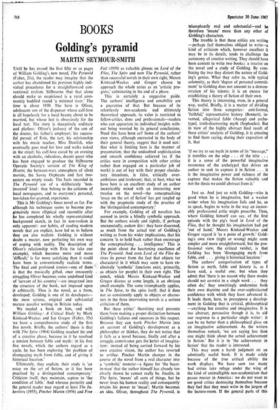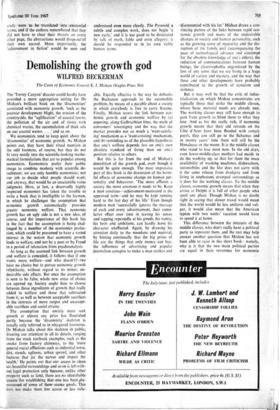Golding's pyramid BOOKS
MARTIN SEYMOUR-SMITH
Until he has passed the first fifty or so pages of William Golding's new novel, The Pyramid (Faber, 21s), the reader may imagine that the author has abandoned his previous highly indi- vidual procedures for a straightforward con- ventional realism. Stilbourne (but that alone should make us suspicious) is a rural com- munity huddled round 'a minimal river.' The time is about 1930. The hero is Oliver, adolescent son of the dispenser whose calf-love is all hopelessly for a local beauty about to be married, but whose lust is obsessively for the local tart. The story is deceptively ordinary and plotless: Oliver's jealousy of the son of the doctor, his father's employer; his success- ful pursuit of Evie, the tart; his relationship with his music teacher, Miss Dawlish, who eventually goes mad for love and walks naked in the street; his calf-love cured by an evening with an alcoholic, ridiculous, decent queer who has been engaged to produce the Stilbourne Operatic Society's version of The King of Hearts; the between-wars atmosphere of silent movies, the Savoy Orpheans and fast two- seaters on empty roads. The facts recorded in The Pyramid are of a deliberately 'non- invented' kind : they belong to the columns of local newspapers, and to everyone's personal, too-taken-for-granted, experience.
This is Mr Golding's finest novel so far. For although his technique seems to become pro- gressively more elliptical and recondite after he has completed his wholly representational background sketch, in fact its non-realism is only apparent: our habits, of reading modem novels that are explicit, have led us to believe they are also realistic. Golding is without doubt a master, now perfecting his own way of coping with reality. The description of Oliver's relationship with Evie (to take one example), which becomes more and more 'difficult,' is far more satisfying than it could have been in conventionally realistic terms. The final and profound ironies—one of them is that the musically gifted, once innocently struggling Oliver becomes some undefined kind of 'servant of his country'—are integrated into the structure of the book, not imposed upon it arbitrarily. Thus is the novel, as a form, developed; Golding is one of its developers— the most serious, original and substantial mature novelist writing in Britain today.
We needed a book on him, and with William Golding : A Critical Study by Mark Kinkead-Weekes and Ian Gregor (Faber, 35s) we have a comprehensive study of the first five novels. Briefly, the authors' thesis is that with The Spire (1964) Golding reached the end of a creative phase, because in it he resolved a tension between fable and myth: in his first five novels, which the authors regard as a cycle, he has been exploring 'the problem of disengaging myth from fable, and of giving it historical location.'
Ultimately, they explain, their study is 'an essay on the art of fiction, as it has been practised by a distinguished contemporary.' Criticism itself, they maintain, aspires to 'the condition of fable.' And whereas posterity and the general reader may regard at least The In- heritors (1955), Pincher Martin (1956) and Free Fall (1959) as valuable glosses on Lord of the Flies, The Spire and now The Pyramid, rather than successful novels in their own right, Messrs Kinkead-Weekes and Gregor choose to approach the whole series as an 'artistic pro- gress,' culminating in the end of a phase.
This is certainly a suggestive guide. The authors' intelligence and sensibility are a guarantee of that. But because of its relentlessly neo-academic and ultimately theoretical approach, its value is restricted to fellow-critics, dons and professionals—readers who can appreciate its individual insights with- out being worried by its general conclusions. Need this have been so? Some of the authors' own views, although encrusted in the body of their general theory, suggest that it need not: that what is limiting here is the manner of presentation; that the undoubted sophistication and smooth confidence achieved (as if the critics were in competition with other critics rather than engaged on a particular job of work) is out of key with their proper elucida- tor intentions, is false, critically over- ambitious and irrelevant; that, at best, what we have here is an excellent study of an author inextricably mixed with an interesting new treatise on the novel—the conceptualising 'essay on the art of fiction' has got tangled up with the pragmatic study of the practice of the 'distinguished contemporary.'
For example, Golding of all novelists has seemed to invite a blindly symbolic approach. But the authors wisely and rightly, if perhaps unexpectedly, eschew this : they have discerned, as much from the actual text of Golding's writing as from his wider implications, that his concern 'is to hold back rather than encourage the conceptualising . . . intelligence.' This is the point about the heartening excellence of The Pyramid. And even Lord of the Flies de- rives its power from the fact that objects (or characters) in it which may seem to have ex- clusively 'symbolic' functions exist, primarily, as objects (or people) in their own right. The conch, which Messrs Kinkead-Weekes and Gregor discuss at some length, is an obvious small example. The same triumphantly applies, in The Spire, to the spire itself; that it does not so consistently apply to objects or charac- ters in the three intervening novels is a serious criticism of them.
But these critics' theorising zeal prevents them from making a proper distinction between Golding's failures and successes in this respect. Because they can work Pincher Martin into an account of Golding's development as a philosopher or thinker, they do not notice that it fails as a novel because, finally and after a struggle, contrivance gets the better of imagina- tion: instead of being carried forward by his own creative vision, the author has reverted to artifice. Pincher Martin changes in the course of the novel from a real character into a 'symbolic' monster—a figure for 'the beast- in-man' that the author himself has already too clearly shown he cannot really be. Jocelin, in The Spire, 'means' all sorts of things, but he never loses his human reality and consequently retains his power to 'mean'; Martin becomes an idea. Oliver, throughout The Pyramid, is triumphantly real and substantial—and he therefore 'means' more than any other of Golding's characters.
The trouble is that these critics are.writing —perhaps feel themselves obliged to write—a kind of criticism which, however excellent it may be in its details, tends to challenge the autonomy of creative writing. They should have been content to write two books: a treatise on the novel and a study of Golding. By com- bining the two they distort the nature of Gold- ing's genius. What they refer to with typical solemnity, as their 'degree of personal commit- ment' to Golding does not amount to a demon- stration of his talents; it is an excuse for establishing a theory of fiction of their own.
This theory is interesting, even, in a general way, useful. Briefly, it is a matter of dividing fiction into three categories: anti-formal, 'faithful,' representative history (Bennett), in- vented, allegorical fable (Aesop) and arche- typal, truth-discovering myth (Sophocles). But in view of the highly abstract final result of these critics' analysis of Golding, it is amazing to find them saying, during their exposition of it, that 'if we try to see myth in terms of its "message," it trembles on the edge . . . of the trite . . . it is a sense of the powerful imaginative resonance of the archetypal that drives an author to seek to capture it in fiction . . . it is the imaginative power and richness of the capture that makes the fiction valuable and not the thesis we could abstract from it.'
Just so. And just so with Golding—who is good when he is imaginative, but a weaker writer when his imagination fails and he, so to speak, begins to write in the way an inexor- ably professional critic might prescribe. Thus, where Golding himself can say, of the first episode with the pig's head in Lord of the Flies, that he thought his imagination had got 'out of hand,' Messrs Kinkead-Weekes and Gregor regard it 'as a point of growth.' Gold- ing's own view (right or wrong) might seem simpler and more straightforward; but the pro- fessional view, the critical verdict, is that Golding has been 'disengaging myth from fable, and . . . giving it historical location.'
Tice authors' categorisation of types of fiction as myth, fable and history is, as I have said, a useful one; but when they admit that 'there is no reason why these modes should not co-exist in a single work . . . they often do,' they unwittingly undermine both their own doctrine and the over-sophisticated confidence with which they have advanced it. It leads them, here, to presuppose a develop- ment in Golding that is critical, philosophical —anything but creative and imaginative. It is too abstract, persuasive though it is, to aid our response to a particular single writer: it can be no better than a philosophical gloss on an imaginative achievement. As the writers themselves remark, 'we are saying less than one might think about the actual achievement in fiction.' But it is in 'the achievement in fiction' that the reader is interested.
This may seem a harsh judgment on an admittedly useful book. It is made solely because of the true critical ability the wort displays. We have seen too many bad critics take refuge under the wing of the kind of unintelligible neo-academicism that passes muster in America : we do not want to see good critics destroying themselves because they feel that they must write in the jargon of the lecture-room. If the general parts of this study ' were to, be tranSlated• into ••existential • terms, and if the authors remembered that they did not have to clear their throats on every other page, the abstractions would dropsourbf their own accord. More importantly, the `achievement in fiction' would be seen and understood even more clearly. The Pyramid, a subtle and complex work, does not begin 'a new cycle,' and it is too good to be desiccated by talk of myth, fable and even allegory; it should be responded to in • its own richly human terms.











































 Previous page
Previous page